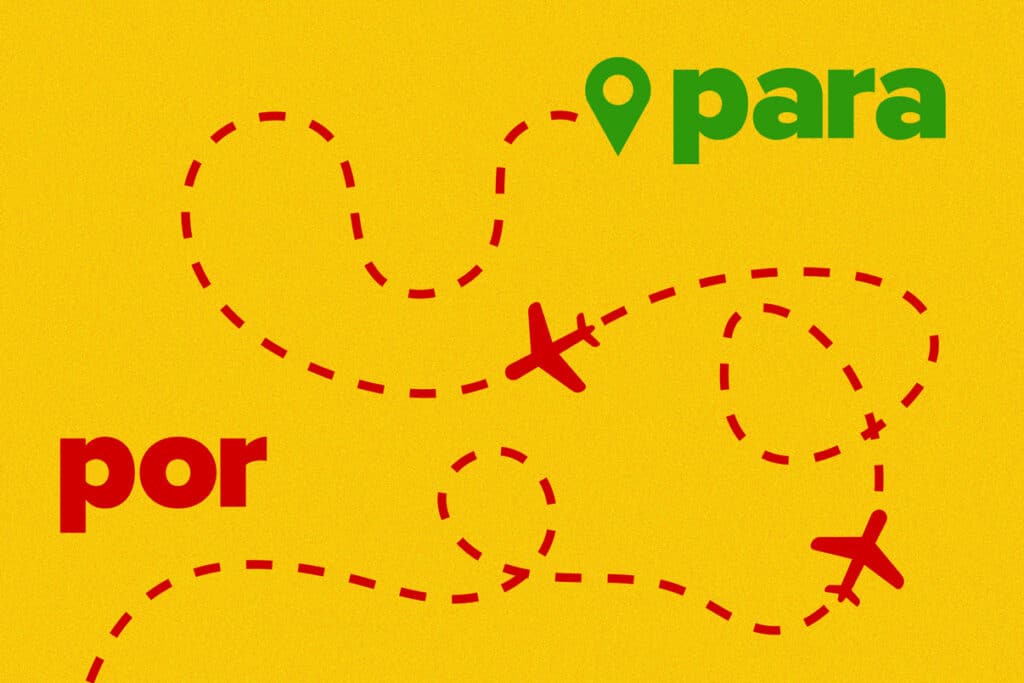
When to Use Por vs Para (Examples Included)
Knowing the difference between por and para can be tricky for most Spanish learners. Both can mean “for,” but they’re used in different situations.
Por is used for reasons, communication, travel, how long something goes on, transactions, substitutes and favors. Para is used when talking about recipients, destinations, goals, opinions and deadlines.
Read on to learn all about when to use each word, plus expressions that contain one or the other.
Contents
- Differences Between Por and Para
- Spanish Expressions with Por
- Spanish Expressions with Para
- Para mí vs. Por mí
- ¿Para qué? vs. ¿Por qué?
- Where to Practice Por Versus Para
Download: This blog post is available as a convenient and portable PDF that you can take anywhere. Click here to get a copy. (Download)
Differences Between Por and Para
| Use por when: | Use para when: |
|---|---|
| Indicating the reason for doing something. You can translate it to “because of.” No ha venido por el mal tiempo. (He has not come because of the bad weather.) | You want to talk about goals and purpose (i.e., "to do something"). Hemos venido para almorzar contigo. (We have come to have lunch with you.) |
| You want to talk about communication and travel. Here, por roughly translates to "via/by" or "through." Me contestó por email. (He answered me via/by email.) Nunca he viajado por Polonia. (I have never traveled through Poland.) | You are referring to a destination or final point. El tren para Lisboa sale en 3 minutos. (The train to Lisbon leaves in 3 minutes.) |
| You need to state how long something goes on. Estuve escribiendo por 3 horas. (I was writing for 3 hours.) | You have to talk about or discuss a deadline. Lo necesito para el lunes. (I need it for Monday.) |
| You want to refer to an exchange or transaction. ¿De verdad has pagado tanto por ese teléfono? (Have you really paid that much for that phone?) Me dio su camiseta por mi camisa. (She gave me her T-shirt for my shirt.) | You need to talk about the recipient of something. Esto es para ti. (This is for you.) |
| One person substitutes or takes the place of another during a task (i.e., "instead of"). Fui a ayudar por mi padre. (I went to help instead of my father.) | You want to give your opinion or talk about someone else’s opinion (can be translated as "according to"). Para mí, esta casa es muy pequeña. (For me, this house is very small.) Para mi madre, eso es muy peligroso. (According to my mother, that is very dangerous.) |
| You do something for someone out of love. Todo esto es por ti. (All this is for you.) |
Spanish Expressions with Por
| Spanish Expressions with Por | Example Sentence |
|---|---|
| Por ahora
(for now) | Por ahora, todo está controlado.
(Everything is under control for the time being.) |
| Por completo
(completely, absolutely) | Se le olvidó por completo.
(He completely forgot about it.) |
| Por ejemplo
(for example) | Juan y Pedro, por ejemplo.
(Juan and Pedro, for example.) |
| Por favor
(please) | Ayúdame, por favor.
(Help me, please.) |
| Por fin
(finally, at last) | ¡Has vuelto! ¡Por fin!
(You are back! At last!) |
| Por lo menos
(at least) | Necesito tres por lo menos.
(I need three at least.) |
| Por lo visto
(apparently) | Por lo visto, él le ha sido infiel.
(Apparently, he has cheated on her.) |
| Por si acaso
(just in case) | Vamos a volver por si acaso.
(Let’s go back, just in case.) |
| Por supuesto
(sure, of course) | ¡Por supuesto que no lo haré!
(Of course I will not do it!) |
| ¿Por qué? Porque...
(Why? because...) | ¿Por qué lloras? Porque estoy triste.
(Why are you crying? Because I am sad.) |
| Gracias por
(thanks for) | Gracias por todo, mamá.
(Thanks for everything, mum.) |
Spanish Expressions with Para
| Spanish Expressions with Para | Example Sentence |
|---|---|
| Para colmo
(to top it all) | Llegó tarde y, para colmo, no pidió disculpas.
(He arrived late and, to top it all, he did not apologize.) |
| Para empezar
(for starters) | Para empezar, vamos a llamar a papá.
(For starters, let’s call dad.) |
| Para entonces
(by then) | Ya había muerto para entonces.
(He was dead by then.) |
| Para nada
(not...at all) | No me gusta para nada.
(I do not like it at all.) |
| Para otra vez
(for another time, for another day) | Dejémoslo para otra vez.
(Let’s leave it for another time.) |
| Para que
/ para qué
(so that, in order to / what for) | Lo hice para que vinieras.
(I did it so that you would come.) |
| Para siempre
(forever) | Quiero estar contigo para siempre.
(I want to be with you forever.) |
| Para variar
(as usual, just for a change) | Has vuelto a mentir, para variar.
(You have lied again, just for a change.) |
| Estar para
(to be about to) | Estaba para salir cuando llamaste.
(I was about to go out when you called.) |
Para mí vs. Por mí
Para mí and por mí are a special case because they not only have a difference in meaning, but they themselves also change meanings depending on where you put them in a sentence.
| Para mí | Por mí |
|---|---|
| At the beginning of a sentence, para mí means “in my opinion.” Para mí, ese niño es muy inteligente. (In my opinion, that boy is very intelligent.) Para mí que está cansado. (In my opinion, he is tired.) | At the beginning of a sentence, por mí means “as far as I am concerned” or “as for me,” adding a sense of indifference. Por mí como si no vuelve. (As for me, he may well never come back.) [And I don’t care.] Por mí que lo metan en la cárcel. (As far as I am concerned, they can put him in jail.) |
| At the end of a sentence, para mí changes its meaning to “for me” (in contexts when we receive something). Este regalo es para mí. (This present is for me.) El café también es para mí. (The coffee is also for me.) | At the end of a sentence, por mí means “instead of me,” “in my place” or “for me” (with the meaning of “for my sake”). Irá de compras por mí. (He will go shopping in my place.) Me dijo la verdad por mí. (He told me the truth for my sake.) |
¿Para qué? vs. ¿Por qué?
Para qué and por qué are not as changeable as para mí and por mí, but they also have a difference in meaning.
We use para qué when we want to ask for what purpose something was done:
- ¿Para qué has comprado eso? (What have you bought that for?)
- ¿Para qué vienes? (For what purpose are you coming?)
On the other hand, ¿por qué? (not to be confused with the other porques) means “Why?” or “For what reason?”
- ¿Por qué has venido tan temprano? (Why have you come so early?)
- ¿Por qué te vas? (Why are you leaving?)
You may think that their meanings are too close or even related, since asking for a reason and asking for a purpose are definitely connected. However, there are situations where it’s obvious which one to use—like when you append no at the end.
¿Por qué no? vs. ¿Para qué no?
¿Por qué no? is used to ask for the reason “why not”:
- ¿Por qué no comes pizza? (Why don’t you eat pizza?)
- ¿Por qué no me hablas? (Why don’t you talk to me?)
¿Para qué no? is a question that follows a negative statement or command. For example:
No uses eso para comer.
(Don’t use that for eating.)
¿Para qué no debo usarlo? No te he oído.
(What shouldn’t I use it for? I didn’t hear you.)
Where to Practice Por Versus Para
This 40-question por versus para quiz will help you assess your knowledge in no time.
Every time you answer a question, you get instant feedback and a grammar explanation.
They even have a quick refresher on por and para at the end!
That’s right—this famous homework aid site has a quiz designed to test your knowledge of the differences between por and para.
Once you’re done with the quiz, you’ll get a quick preview of all the answers you got right and wrong at the end. The only point against this site is that it doesn’t explain why the answers are the way they are. You’ll have to analyze the reasons behind the correct answers on your own.
FluentU uses video clips from authentic Spanish media to teach the language as it’s actually used by native speakers. You can choose from a large library of movie trailers, scenes from TV shows news segments, educational videos and more.
Every video comes with a downloadable transcript, interactive subtitles, a personalized vocabulary quiz and other useful learning tools. As you learn new vocabulary words from the videos, you can add them to a flashcard card for later review.
Here are some additional tips for practicing por versus para:
- Do exercises and take quizzes. This will help you apply the words and remember them better.
- Write down lots of por and para sentences. This will help you start seeing patterns and expressions that repeat themselves so you learn faster.
- Create your own flashcards. This way, your por and para sentences will be with you all the time.
- Read a lot. Context is everything, and reading will give you plenty of real Spanish to gorge on.
- Listen to Spanish podcasts. Listening to podcasts will allow you to hear these prepositions used in natural speech.
- Watch Spanish movies, TV series and YouTube videos. Watching any kind of video material with native Spanish in it has similar benefits as listening to podcasts.
- Try to use por and para whenever you can. Write in Spanish online chats, talk to friends in Spanish, talk to yourself in the mirror, etc.
If you’re more of a visual learner, here’s a video on por versus para:
Now you know a little more about how to tell the difference between por and para.
Keep practicing, and soon it will be easier to use them correctly!







